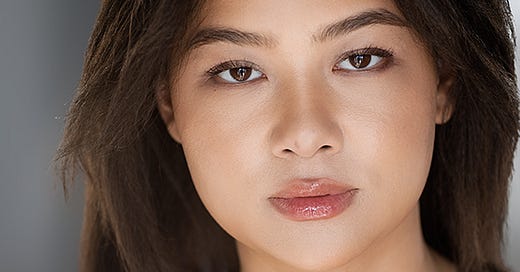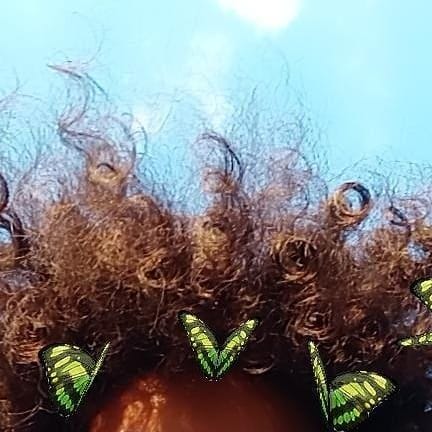Sabrina Jie-A-Fa: “Being different doesn’t have to be a bad thing”
The actor on bridging cultures, accepting herself and showing people who she is
Hi, welcome back to Mixed Messages! This week I’m speaking to actress Sabrina Jie-A-Fa, who is of mixed Chinese, Dominican, Black and Surinamese heritage. Sabrina stars in Egghead & Twinkie, whose director we heard from last week. Sabrina plays the eponymous Twinkie, drawing on her own mixed heritage and personal experiences to play this ‘spitfire’ of a character. Read Sabrina’s story below.
Can you tell me a bit about your family background and how you describe yourself?
My dad is Surinamese, Black and Chinese, and my mom is Black and Dominican. I’m ok with being called mixed-race, it’s very empowering for me.
Have you always called yourself mixed-race? Other terms like biracial are becoming more popular, but that doesn’t fully describe you.
When I was younger I’d call myself biracial because I didn’t really know what it meant. I just thought I’d tick the box that everybody assumed I was in anyway.
I grew up in a predominantly white neighbourhood, so I was bullied a lot, especially targeted to my race and my natural hair, which is very curly. That’s why Egghead & Twinkie is so empowering, it’s a movie about all the difficult things I went through growing up.
Did you ever speak to your family explicitly about being mixed?
Funny enough it was a daily conversation – a lot of the time people are confused about how I grew up with four cultures, but you just do it. We didn’t know any different, we were kids.
There are a lot of similarities within my parents’ cultures, even though we see them as if they’re different. We’re all so alike, if we would just stop for a second we would recognise that. My family did an amazing job of bridging the gaps through food, music and dancing.
It was always an open conversation with myself and my family, and in a house of girls we also had conversations about the oppression we deal with as women, but also as women of colour.
Has your sense of self been consistent over time?
It’s a rollercoaster and you have to roll with the punches. I’m 26 now, so it’s a matter of accepting myself at every stage of my life. Something that’s not really recognised is I’m growing up as a teenager, which is hard, as well as being a young adult, all these things are overwhelming, and I think having a community of other women around you is so important, whether that's your family or friends. It’s about surrounding yourself with people who are actively caring and proactive about your mental health.
The character of Twinkie is also mixed, and I know that you connected with director Sarah Kambe Holland while shooting Egghead & Twinkie – what was that experience like for you?
It was something that was important for both of us. Especially after the short film, which was such an encapsulated small story. In the feature film, it was important to expose that part of Twinkie and make her face that. It’s something that a lot of young people have to deal with, to get to know that “I am different and that doesn’t necessarily have to be a bad thing.” It can be scary, but it doesn’t have to be bad.
There’s a line in the film where someone says to Twinkie, “you’re a little bit of everything.” That was taken from an actual conversation where I said “you kind of feel like you don’t exist.” People will put you in a box, but because I come from so many boxes, I’m going to show you who I am. People can’t say “well she’s gonna be the nerdy Asian” or “she’s gonna be the Black girl.”
Twinkie is such a little spitfire and we knew that she’d have some hesitation growing up with her two adopted white parents, but it was something we wanted to tackle and I’m really happy that we did. I’m glad she got to talk about all sides of her, not just the Asian side.
What are your thoughts on Twinkie calling herself Twinkie – is it a power move so other people couldn’t hurt her with it?
I think it’s that. Growing up, I know that Sarah struggled with being biracial. When I read the script, it was a beautiful portrayal of reclaiming the things that we were once bullied for and used against us racially. My angle on that title is that you can’t use it against her anymore. The same with Egghead, allies are important. Twinkie isn’t just doing it herself.
How does your ethnicity influence the roles you choose to play?
I’m open to playing just Asian roles, we’re all in the East Asian category so I feel more comfortable. I draw the line at things where I know that I'm not, like I'm not Indian.
Colourism is a huge issue in the industry and I’m not going to apply for a role that is not looking for someone who is mixed-Black or is specifically about being a dark-skinned Black girl. I always think, would I want that erasure to happen to me? I know what I am and I know what I’m not, physically. But when it comes to open ethnicities, I tell my agent to put me up for everything.
What’s the best thing being mixed has given you?
Acceptance of myself. You have all these things that you have to accept, and you have to absorb that as a young person all at once. I love myself now, and that’s a powerful thing. At first it was a terrifying thought, because what does it mean to love myself? That I am all of these things? Yeah, I am. I don’t want to minimise these things. That played a huge part in my mental health, that awareness of how I came across in life.
Can you sum up your mixed experience in a word?
Love. Also, journey and joy – that’s my middle name.
Watch Egghead & Twinkie at the Bristol Queer Vision Film Festival on June 25th, and check the website for future screenings. Don’t forget to follow the film on TikTok. Next week, I’ll be speaking to author Nicola Dinan. Subscribe to get Mixed Messages in your inbox on Monday.
Enjoy Mixed Messages? Support me on Ko-Fi! Your donations, which can start from £3, help me pay for the transcription software needed to keep this newsletter weekly, as well as special treats for subscribers. I also earn a small amount of commission (at no extra cost to you) on any purchases made through my Bookshop.org affiliate links.
Mixed Messages is a weekly exploration of the mixed-race experience, from me, Isabella Silvers. My mom is Punjabi (by way of East Africa) and my dad is white British, but finding my place between these two cultures hasn’t always been easy. That’s why I started Mixed Messages, where each week I’ll speak to a prominent mixed voice to delve into what it really feels like to be mixed.







